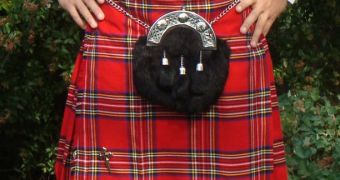A team of Scottish researchers have recently made it public news that, according to their investigations, kilts yield significant health benefits.
More precisely, it appears that these items of clothing make men more fertile than their pants-wearing counterparts.
By the looks of it, it all comes down to making sure that a man's intimate parts are not exposed to particularly high temperatures.
Thus, the researchers say that, as long as the temperature of said part of the male anatomy is roughly three degrees Celsius lower than the temperature of the rest of the body, men are bound to experience an increase in their fertility.
Given these assumptions, it need not come as a surprise that, from the researchers’ standpoint, kilts are best worn the traditional way (i.e. without undergarments).
Dr. Erwin Kompanje, one of the specialists who helped piece together this study into the health benefits of wearing kilts, explains that kilts encourage the development of a physiological environment that benefits the process of producing male gametes.
Because of this, it is recommended that men who are trying to conceive opt for kilts rather than trousers.
“It seems plausible that men should wear skirts and avoid trousers, at least during the period during which they plan to conceive children,” the study published by these researchers reportedly reads.
Daily Mail informs us that, apart from its helping men be more fertile than they would be should they wear pants on a regular basis, said item of clothing also makes it easier for men to build confidence.
This is because kilts allegedly make men feel both masculine and admired.
As the researchers put it, “Research has shown that wearing a kilt gives a man a strong sense of masculinity and freedom. Many women are attracted to men in kilts. It also gives a man a sensuous awareness of his body.”
A detailed account of how kilts improve male fertility was published in the Scottish Medical Journal.

 14 DAY TRIAL //
14 DAY TRIAL //